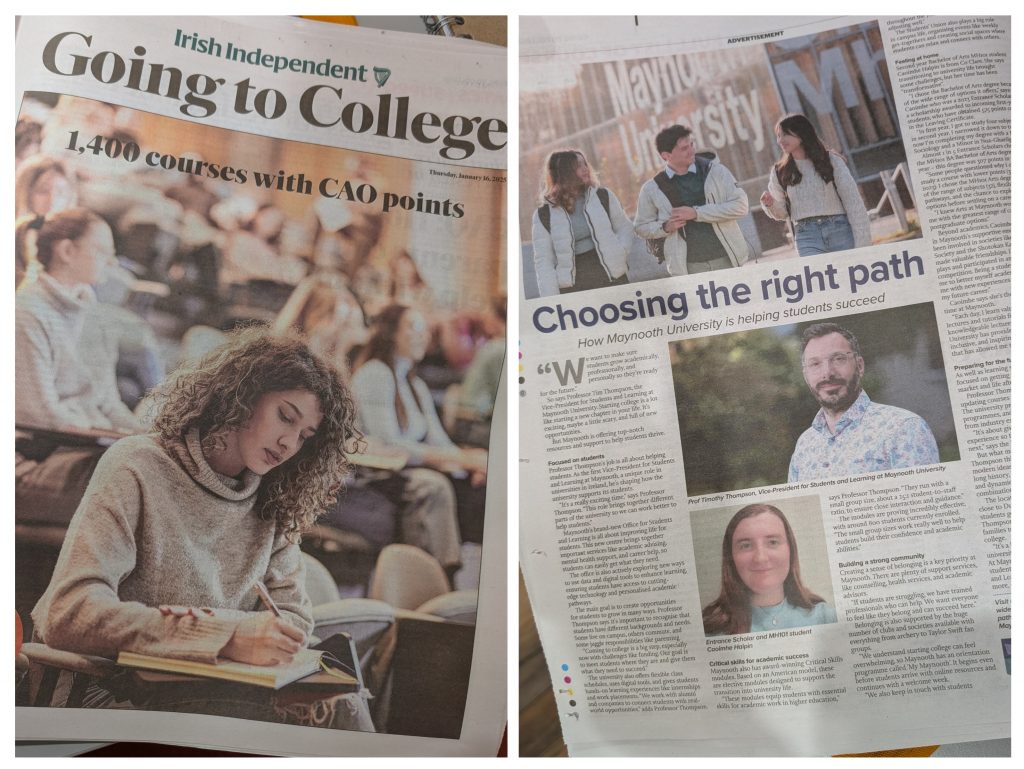It’s that time of the year again when our attention is drawn to university applications. In fact, I’ve even been in the newspaper talking about it all. This year is especially exciting since our own eldest child is in the process of applying. It’s interesting seeing it from the other side and realising that I’m in big trouble – if I can’t get my own child to read university emails, how on Earth am I going to get all my MU students to do so?

It’s also that time of the year where people ask the question as to whether its worth going to university at all, especially given the cost. Have a guess where I land on this issue. Yes there’s always the focus on higher salaries for the student, but the data also shows that graduates have more stable careers overall. More widely, a healthy university sector supports research and innovation with graduates better able to utilise these new technological developments. There’s also evidence to show that the halo effect of one person going to university is significant – from the local economy to the wider family of that student. There are always people who succeed in developing new things or leading companies and the like without going to university, but these are in the minority and if you play the odds, going to university is a surer bet for enhancing your future. There’s a whole sub-plot in Disney’s fun Star Wars: Skeleton Crew that circles around this very issue. Oh, and rest assured fellow anthropologists, because I know what you’ve been wondering and Skeleton Crew does indeed have skeletons.
It’s also interesting having moved from the UK to Ireland, where higher education is more overtly valued. Indeed, a recent report showed that Ireland has the highest rate of third-level education in the EU, with 56 per cent of people aged 25-64 in Ireland having attained a third-level qualification, compared with an EU average of 35 per cent. There are some unsurprising generational differences in levels, as well as regional variation, but on the whole it presents an extremely positive picture. Of course, a natural response to this has been to ask whether too many people are studying at university at the expense of more vocational or skills-based disciplines.
It’s not helpful when the debate is presented as an either/or. But as Denzel Washington states while chewing up the scenery of ancient Rome in Gladiator 2, “it’s politicsssss”. We shouldn’t forget, for example, that some subjects require both high level critical thinking and practical skills – things like nursing, which in the modern context is both technically and intellectually demanding. If, as I’ve said above, universities are at the forefront of developing the new tools and processes for the workplace, shouldn’t we also be at the forefront of developing the skills that are needed to benefit from that?
The balance between traditional education and skills training is also addressed by Michael M. Crow and William B. Dabars in their book, The Fifth Wave: The Evolution of American Higher Education. The book was recommended to me by an American colleague, although to be fair, I have already read Crow’s previous book on the subject of American universities. It’s a long book and I’m a slow reader and rather like the Mad Men tv series, I respected it but didn’t really enjoy it. TLDR: We need to transform US universities to widen their access and societal impact. There. I’ve saved 477 pages. I think one of the reasons that I wasn’t completely bowled over by it, was because much of what is discussed and proposed has already been attempted (with varying degrees of success) in the UK, Ireland and Australia. Probably the key takeaway for me was the demonstration of the power of a strong whole-institution approach to achieving your strategic goals. Other than that, there are many other good points that are made in the book. For example, it’s where the data on the generational impact of universities is presented, as is the 2016 data that shows that per capita GDP correlates with educational attainment. They also note that the “lack of accessibility to knowledge is a principal factor in exacerbating social inequality and diminishing our national potential for innovation, economic adaptability, and socioeconomic mobility”. That’s something that we can address through widening access to higher education – both during the main application stage, like now, and also through engaging with some form of life-long learning. If HE is so important to the person, their family, society, the economy and the nation, why would we only want people to access it between 18 and 21? People should be coming back time and again, dipping in and out of HE whenever they want or need.
But to do that, we do need to adapt as Crow and Dabars argue. And baking adaptability into the way universities function or the courses we deliver can be challenging. They are large, complex organisations. During COVID someone (and I cannot for the life of me remember who) pointed out that universities are much like towns – with housing, theatres, restaurants, offices, green spaces, and so on. Yet evolution is a necessary component to ensure that we maintain our active contribution to the wider world – something that John O’Halloran MRIA, President of University College Cork (UCC) and biologist, notes in his recent AdvanceHE blog: “evolution is not about the survival of the strongest, but of those who are most adaptable to change”. There’s an interesting tension then, lurking in the context of organisations that struggle to adapt but are working hard to make graduates that are inherently adaptable.
When I talk to people thinking of going to university, including to my own offspring and certainly in the piece in the Irish Independent above, I always emphasis that it gives you more opportunities throughout your life. That’s it. Which is also why I strongly believe in opening up HE to all – so everyone can benefit from those opportunities.
